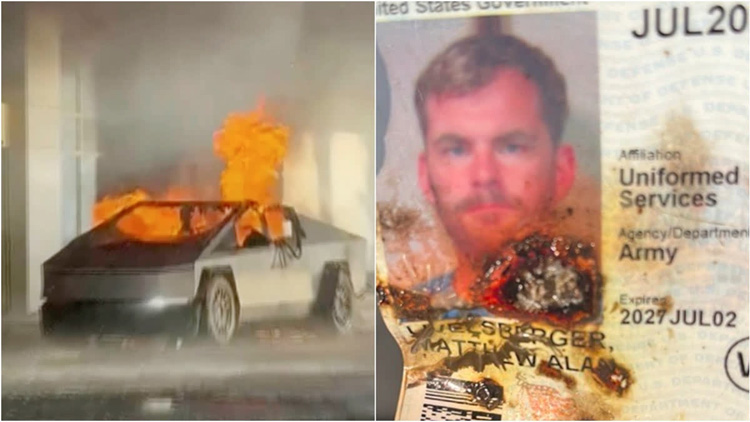Cybertruck blast: US army man who killed self told ex-girlfriend about ‘Afghanistan trauma’
Army soldier Matthew Livelsberger, who died by suicide in the Tesla Cybertruck explosion outside Trump International Hotel in Las Vegas, had confided about his struggles to his former girlfriend, who had also served in the Army as a nurse.
Green Beret, 37, was a decorated US Army Special Forces soldier who was a five-time recipient of the Bronze Star, including one with V device for valor under fire, as reported by The Associated Press. Livelsberger had an outstanding record in the military that spanned the world.
The soldier’s new baby was also born last year. However, he was struggling with post-traumatic stress disorder (PTSD), which came as a result of his service wherein he was required to kill and witness the deaths of fellow soldiers.
Silent suffered but, confided in ex-girlfriend
While mostly Livelsberger suffered silently, in private, he recently decided to take up treatment for depression from the Army, AP reported citing a US official, who spoke on condition of anonymity.
The Special Forces soldier had also found a confidant in his ex-girlfriend, a former nurse in the Army, who he started dating in 2018.
Livelsberger and a 39-year-old Alicia Arritt had met through a dating app while they were in Colorado Springs. Arritt served at the largest US military medical facility in Europe, the Landstul Regional Medical Centre in Germany. At this centre, many soldiers’ combat injuries from Afghanistan and Iraq were given initial treatment before being moved to the States.
The former nurse witnessed and treated several traumatic brain injuries (TBIs), which are serious but hard to diagnose. However, they can have effects that can take years to realise. “I saw a lot of bad injuries. But the personality changes can happen later” Arritt said.
Livelsberger gave a peak into his suffering to Arritt over text and multimedia messages. “Just some concussions,” he said in a text about his deployment to Afghanistan’s Helmand Province.
To mark the lives he took in Afghanistan, he had even gotten a graphic tattoo on his arm of two skulls being pierced by bullets, the photo of which he sent to Arritt.
Livelsberger spoke to his ex-girlfriend about the exhaustion and pain he felt in Afghanistan, telling her that he was not able to sleep as he kept reliving the violence of his service.
“My life has been a personal hell for the last year,” he texted Arritt during the early days of their dating, AP reported, adding that it was “refreshing to have such a nice person come along”.
Las Vegas law enforcement officials on Friday released excerpts from the messages Livelsberger had left behind. It suggested that the Special Forces soldier killed himself intentionally and that his death acted both as a “wakeup call” but also to “cleanse the demons” he was facing after taking lives and losing his fellow soldiers.
“This was not a terrorist attack. It was a wake-up call,” Livelsberger said in his notes.
‘Symbolism’ with Tesla car and Trump hotel
While several questions were being raised at the Tesla Cybertruck’s explosion taking place outside the hotel owned by US President-elect Donald Trump, officials clarified that Livelsberger had no ill will toward the Republican leader.
In fact, Arritt said that both she and Livelsberger were fans of Elon Musk’s Tesla. “I had a Tesla too that I rescued from a junkyard in 2019, and we used to work on it together, bond over it,” she was quoted as saying by AP.
After the couple broke up in 2021, they stopped talking and Arritt did not hear from him for more than two years, until he suddenly reached out to her on December 28 and then again on December 31.
He had sent high-spirited messages to his ex-girlfriend, including a video of him driving the Cybertruck and another one of its dancing headlights. However, Arritt also said that Livelsberger felt things “very deeply and I could see him using symbolism” of both the truck and the hotel.
She said that the deceased was not an impulsive man, so as per her suspicion, “he was probably thinking it out”.
Notably, Arritt was on active duty from 2003 to 2007 and then was in the Army Reserve until 2011. She said that she saw TBI symptoms in Livelsberger as early as 2018.
“He would go through periods of withdrawal, and he struggled with depression and memory loss,” Arrit said, adding that she doesn’t know what drove him to take such an extreme step. “But I think the military didn’t get him help when he needed it,” she noted.
Reminiscing the “sweet, kind” nature of Livelsberger, Arritt said that he had a really deep well of inner strength and character, “and he just had a lot of integrity”.
Arritt had even nudged the Green Beret to seek help when he was struggling during their dating years. But he used to refuse, saying that it could cost him his ability to get deployed if authorities found him medically unfit.
“There was a lot of stigma in his unit, they were, you know, big, strong, Special Forces guys there, there was no weakness allowed and mental health is weakness is what they saw,” AP cited Arritt as saying.
After denoting the fireworks, mortar and fuel-filled Cybertruck, Livelsberger had shot himself in the head on January 1. The explosion had injured seven people.
He had served in the elite Green Berets of the US Army for more than 19 years and had recently separated from his wife.

